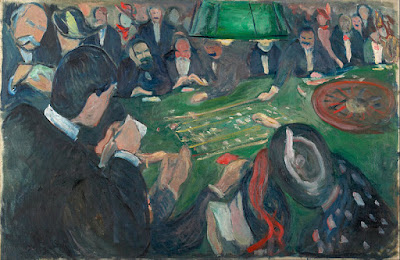Financial Hell
Fyodor Dostoevsky is one of the most accessible authors ever. Never more so in his short work, The Gambler (1866), his piercing study of the psychological processes of a cash-obsessed mind. Written in the space of a month, Dostoevsky went man-to-man with his own addiction, hoping the finished book would pay off his roulette debts. The novella may have worked for Dostoevsky in the short term, but its unflinching honesty makes The Gambler such enduring reading today.
Dostoevsky’s financial problems – his severe debts, his gambling losses – riddled his life with hardship. He endured poverty throughout his most crucial decades, namely in the 1860s when he wrote his most celebrated works. For a writer who mined reality for material, Dostoevsky’s perpetual financial worries managed to provide some benefits. His desperation to alleviate his circumstances -- the quest for a steady income -- did well to exercise his moral conscience. In an early letter, he wrote that ‘debt tortures me so morally that I have never all my life been in such an ambiguous, vile situation’. He added that such incidents ‘will make . . . splendid episode[s] for a novel’, paying attention to the edifying effects of such suffering [1].
Set in Roulettenberg (a German city sitting on the Rhine, based on Wiesbaden), The Gambler’s narrative is steeped in conviction. Every time the narrator, Alexey Ivanovich, returns to the roulette table he is completely certain he will win. This sense, the deep dredges of his feeling, is totally spell-binding: ‘I confess that my heart was pounding’, he says, stepping once again into a casino, ‘something radical and final would take place in my destiny without fail’ (p. 13). The emotions that motivate Alexey’s gambling are fundamental: they reveal the universal appeal of chance. It is a driver, a rod that reels Alexey in; once the roulette table hooks itself to his psyche, Alexey is dead-determined to profit no matter what.
Even if it means losing thousands. ‘I am speaking to clear my conscience’ is Alexey’s reason for telling his story, as catharsis takes centrefold in this tale of constant ups and downs. And he is not alone. Alexey socialises with a group of affluent aristocrats who also squander their money on casino games. They can afford their losses, while Alexey depends on his earnings. He is always dead broke – even when he wins top sums.
Because it is the gambler’s mindset which is so crucial to this story’s tension. When Alexey befriends a rich Russian lady residing at Roulettenberg’s spa, a manor-owner who possesses lump sums, he witnesses his own behaviour at work in another. The lady’s grandchildren are also present. All are set on winning her inheritance, the divides of her substantial wealth. But a first-time gambler contracts the addict’s itch: she becomes a regular at the roulette table, swooning to its charm. After a long losing streak her relatives hold their breath. She gambles more, removing 20,000 roubles from a purse (roughly £153,415, according to purchasing power in 2008) then stakes it all. She bites at her companion’s reservations: ‘Life’s not worth living if I don’t win it back. Stake!’ (p. 106). Consequently she loses everything – a grand total of 90,000 roubles by the novel’s end. The rotation begins, and the roulette table reveals its function: to promise fortunes, whilst returning very little – or nothing at all.
Dostoevsky is careful to deflect moral arguments on the nature of gambling (probably due to personal embarrassment, having squandered his real-life finances). Rather, he presents the gambler’s trade for all its thrills. Alexey says, ‘I definitely see nothing filthy in the desire to win as quickly as possible as and as much as possible’ (p.13). He views desire as a curiosity.
Dostoevsky’s attempt to save himself at the writing-desk instead of the gaming rooms places his character on the precipice of fiery desperation, an eternal addiction. Alexey’s final words express his inability to lose heart – that he will win at least one more time, when ‘it’s action that is called for’; when a last spin at the roulette table will raise him back from the dead.
Note:
[1] Quoted in Liza Knapp, ‘For God and Money’ in Times Literary Supplement, no. 4467, 11 November 1988, p. 1246.
Source:
The Gambler and A Nasty Business. By Fyodor Dostoevsky (trans. by Ronald Meyer). London: Penguin Random House, 2010. 978-0-241-25958-0.
 | |||
| At the Roulette Table in Monte Carlo (1892) by Edvard Munch.© Munch Collection | |


Comments
Post a Comment